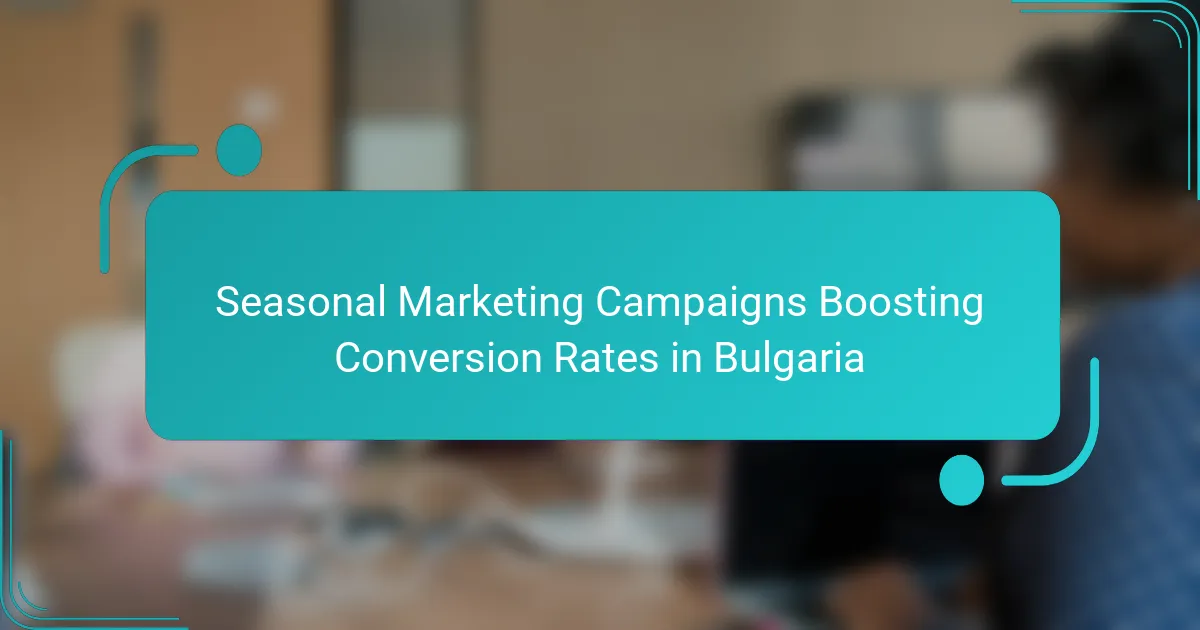Seasonal marketing campaigns in Bulgaria can greatly enhance conversion rates by synchronising promotional activities with local holidays and cultural events. By crafting timely offers and localised messaging, businesses can effectively engage customers and boost sales during peak shopping times.
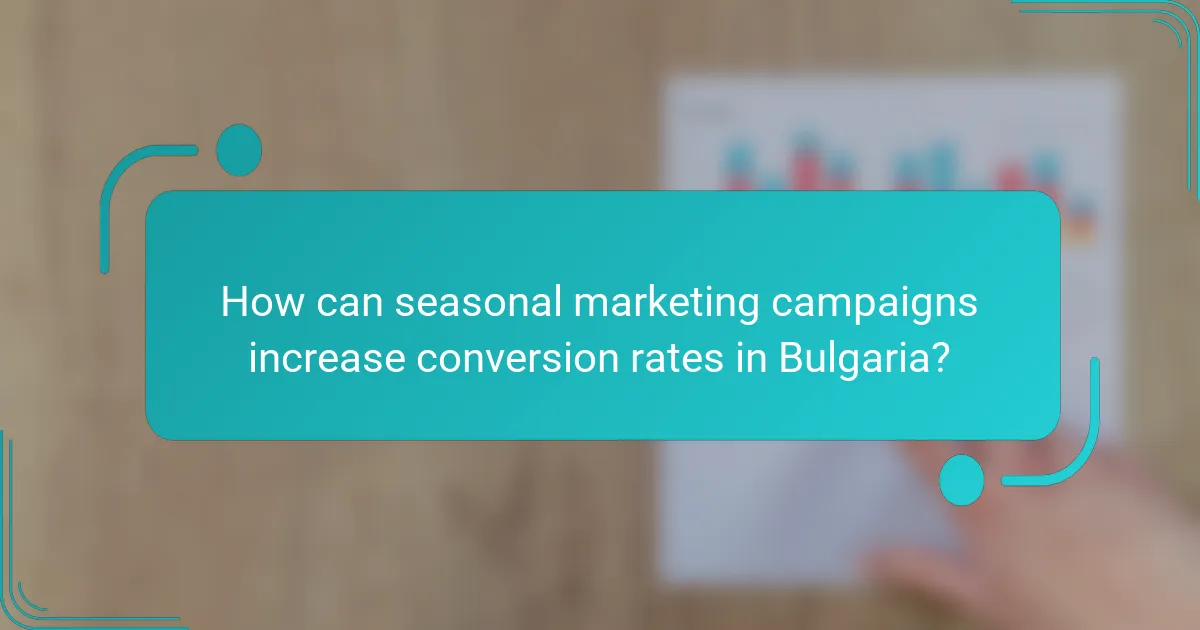
How can seasonal marketing campaigns increase conversion rates in Bulgaria?
Seasonal marketing campaigns can significantly boost conversion rates in Bulgaria by aligning promotional efforts with local holidays and cultural events. By leveraging timely offers and localised messaging, businesses can engage customers more effectively and drive sales during peak shopping periods.
Targeted promotions during holidays
Implementing targeted promotions during Bulgarian holidays, such as Christmas and Easter, can enhance customer engagement. Offering discounts or special bundles tailored to these occasions can attract shoppers looking for gifts or festive products.
Consider using limited-time offers that create urgency, encouraging customers to make quick purchasing decisions. For example, a 20% discount on selected items during the week leading up to Christmas can effectively increase foot traffic and online sales.
Localised content strategies
Localised content strategies are essential for resonating with the Bulgarian audience. Crafting marketing messages in Bulgarian and incorporating local traditions can make campaigns more relatable and appealing.
Utilise culturally relevant imagery and references in your advertising. For instance, highlighting traditional Bulgarian foods or customs in your promotional materials can create a stronger connection with consumers, leading to higher conversion rates.
Utilising social media trends
Leveraging social media trends is crucial for reaching a wider audience in Bulgaria. Platforms like Facebook and Instagram are popular for sharing seasonal promotions, and aligning your campaigns with trending topics can enhance visibility.
Engage with users through interactive content, such as polls or contests related to seasonal themes. This not only boosts engagement but also encourages sharing, which can amplify your reach and ultimately increase conversion rates during key shopping seasons.
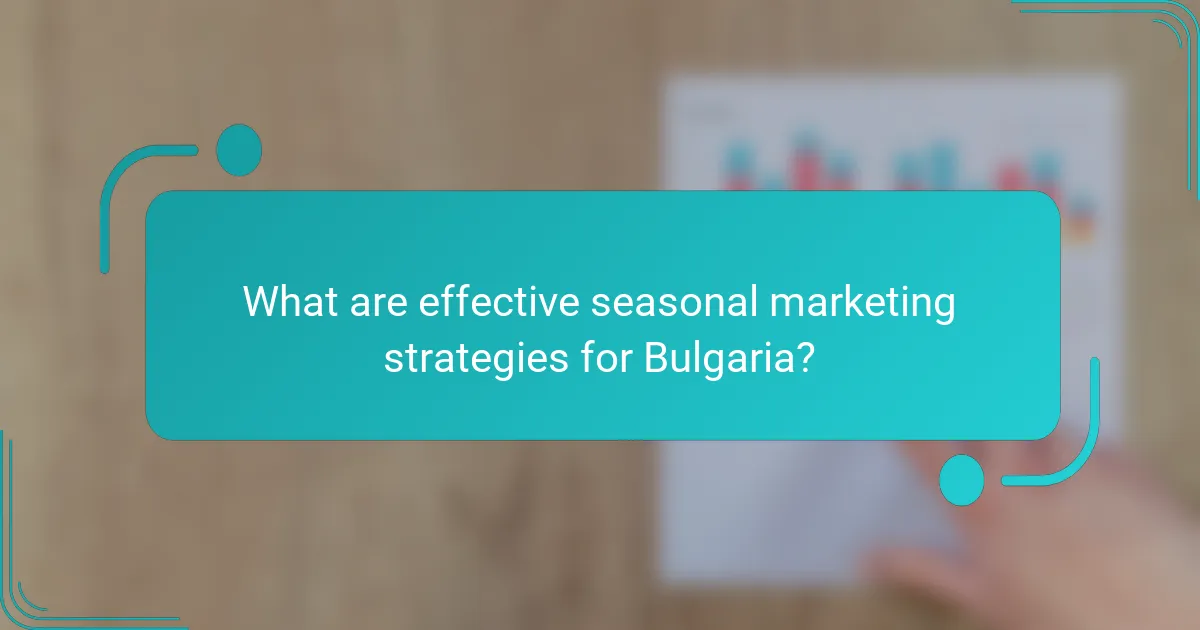
What are effective seasonal marketing strategies for Bulgaria?
Effective seasonal marketing strategies for Bulgaria focus on leveraging local holidays and cultural events to engage customers. Tailoring campaigns to resonate with Bulgarian traditions can significantly enhance conversion rates and customer loyalty.
Festive email marketing campaigns
Festive email marketing campaigns are a powerful way to connect with customers during peak shopping seasons in Bulgaria, such as Christmas and Easter. These campaigns should highlight special offers, seasonal products, and personalised messages that reflect local customs.
To maximise impact, consider segmenting your email list based on customer preferences and past purchases. Use eye-catching subject lines and engaging visuals to increase open rates, aiming for a clear call to action that encourages immediate purchases.
Influencer partnerships for seasonal products
Partnering with local influencers can amplify your reach during seasonal marketing campaigns in Bulgaria. Influencers can showcase your products in authentic settings, making them more appealing to their followers and enhancing trust in your brand.
When selecting influencers, look for those whose audience aligns with your target market. Collaborate on content that highlights seasonal promotions or unique product features, and consider offering exclusive discounts to their followers to drive conversions.

Which tools enhance seasonal marketing efforts?
Several tools can significantly enhance seasonal marketing efforts by providing insights and facilitating communication with customers. Utilising the right platforms can lead to improved tracking, engagement, and ultimately, higher conversion rates.
Google Analytics for tracking performance
Google Analytics is essential for tracking the performance of seasonal marketing campaigns. It provides detailed insights into user behaviour, traffic sources, and conversion rates, allowing marketers to assess what strategies are effective.
To maximise its benefits, set up goals that align with your seasonal objectives, such as increased sales or newsletter sign-ups. Regularly review the data to identify trends and adjust your campaigns accordingly.
Mailchimp for email campaigns
Mailchimp is a powerful tool for managing email campaigns, especially during seasonal promotions. It allows businesses to create targeted email lists and automate campaigns, ensuring timely communication with customers.
When using Mailchimp, segment your audience based on previous interactions or preferences to increase engagement. Monitor open and click rates to refine your approach and avoid common pitfalls like sending too many emails, which can lead to unsubscribes.
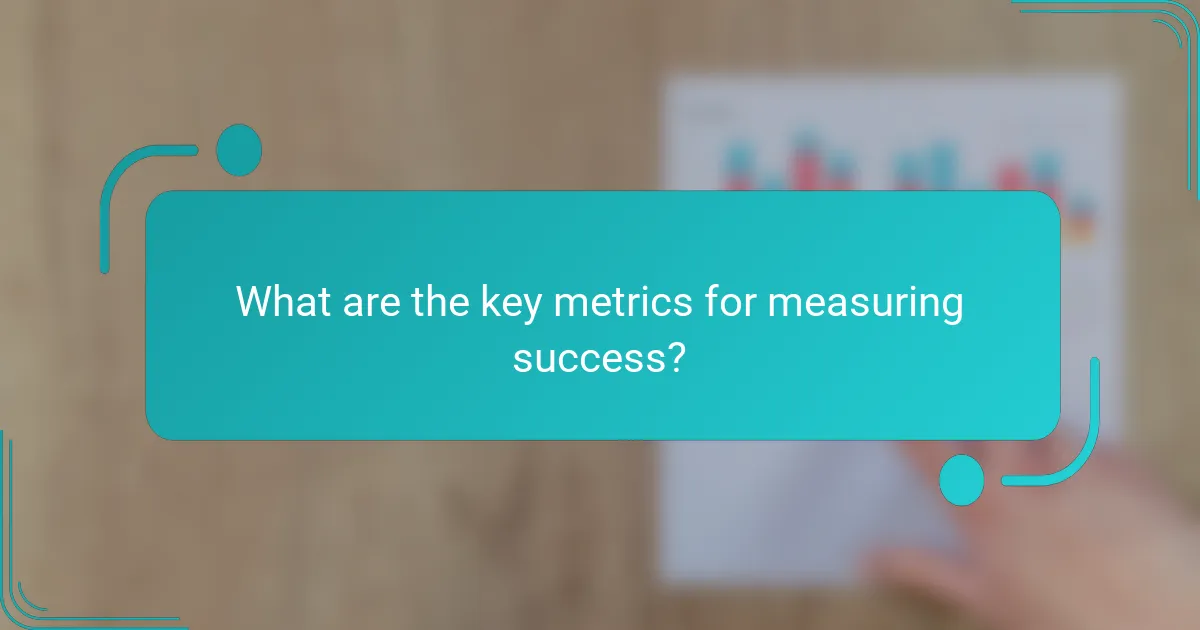
What are the key metrics for measuring success?
Key metrics for measuring success in seasonal marketing campaigns include conversion rates and customer engagement metrics. These indicators provide insights into how effectively your campaigns are driving sales and fostering customer interactions.
Conversion rate tracking
Conversion rate tracking is essential for understanding the effectiveness of your marketing efforts. This metric is calculated by dividing the number of conversions by the total number of visitors, then multiplying by 100 to get a percentage. In Bulgaria, a conversion rate of 2-5% is often considered average for e-commerce sites.
To improve conversion rates, focus on optimising landing pages, simplifying the checkout process, and using clear calls to action. A/B testing different elements can also help identify what resonates best with your audience.
Customer engagement metrics
Customer engagement metrics gauge how actively customers interact with your brand during a campaign. Key indicators include email open rates, click-through rates, and social media interactions. For instance, a good email open rate in Bulgaria might range from 15-25%, while click-through rates can vary between 2-5%.
Enhancing customer engagement can be achieved through personalised content, timely responses to inquiries, and interactive social media posts. Monitoring these metrics allows you to adjust your strategies in real-time, ensuring your campaigns remain relevant and effective.
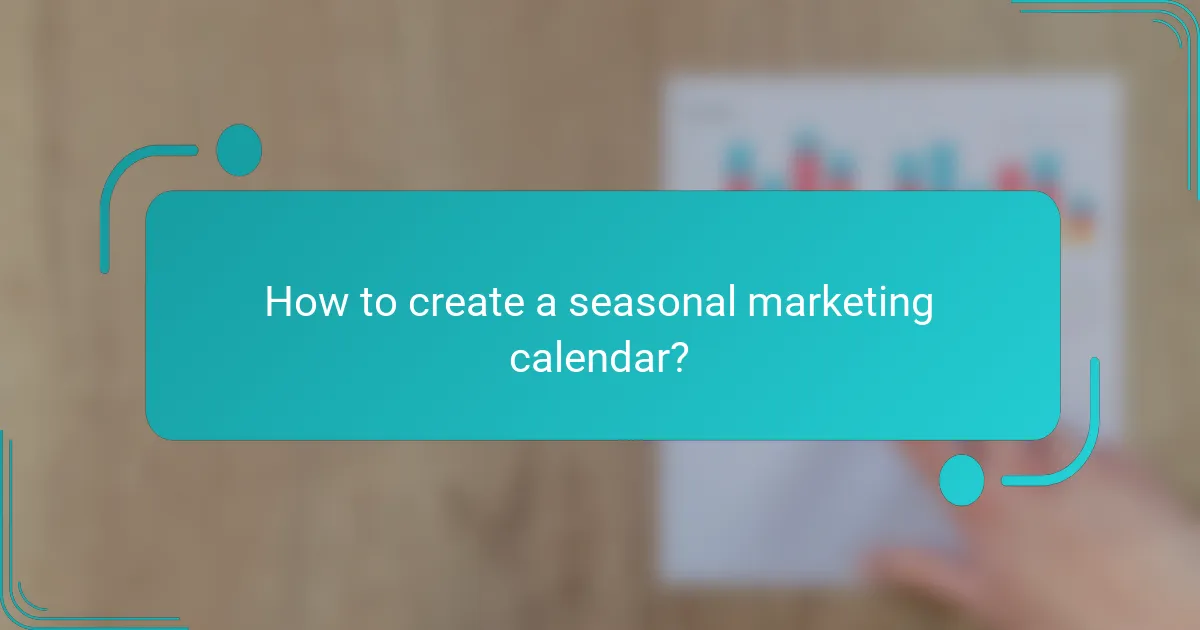
How to create a seasonal marketing calendar?
Creating a seasonal marketing calendar involves identifying key periods throughout the year when consumer behaviour shifts, allowing businesses to align their marketing strategies accordingly. This proactive approach helps in maximising engagement and conversion rates during peak shopping times.
Identify key holidays and events in Bulgaria
In Bulgaria, several holidays and events significantly influence consumer spending patterns. Key dates include New Year’s Day, Easter, and Christmas, as well as local festivals like the Rose Festival in Kazanlak. Understanding these occasions allows businesses to tailor their marketing efforts to resonate with local traditions and consumer sentiments.
Additionally, consider events like Black Friday and Cyber Monday, which have gained popularity in recent years. These occasions present opportunities for significant sales and promotions, appealing to both local and online shoppers.
Plan promotional activities in advance
Effective seasonal marketing requires early planning of promotional activities. Start by mapping out your calendar with key dates and brainstorming relevant campaigns that align with each occasion. This might include discounts, themed content, or special events that attract customers.
It’s essential to allocate resources early, ensuring that your marketing materials, inventory, and staffing are ready ahead of time. Common pitfalls include last-minute promotions that lack cohesion or fail to capture consumer interest. Aim to create a cohesive narrative that connects your brand with the seasonal themes.
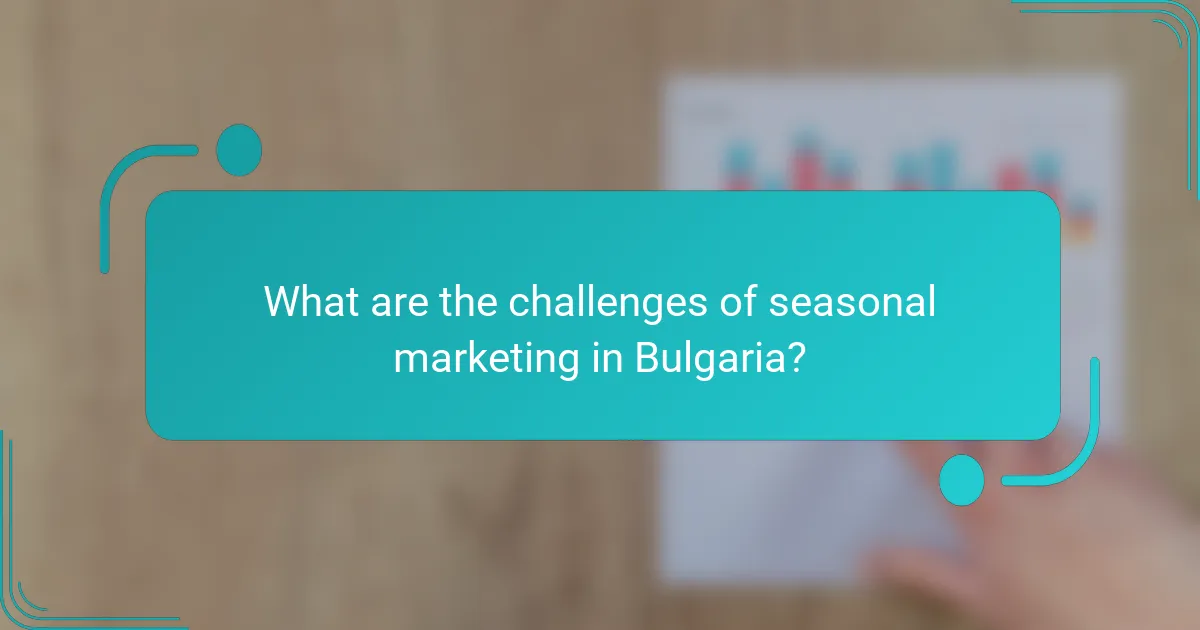
What are the challenges of seasonal marketing in Bulgaria?
Seasonal marketing in Bulgaria faces several challenges, including intense competition and shifting consumer preferences. Businesses must navigate these hurdles to effectively engage customers and drive conversions during peak seasons.
Market saturation during peak seasons
During peak seasons, such as Christmas and Easter, the Bulgarian market becomes saturated with promotional campaigns. This saturation makes it difficult for individual brands to stand out, as consumers are bombarded with offers from numerous competitors.
To combat market saturation, businesses should focus on unique selling propositions (USPs) and targeted messaging. Highlighting distinctive features or local ties can help capture consumer attention amidst the noise.
Adapting to changing consumer behaviour
Consumer behaviour in Bulgaria is evolving, influenced by factors such as economic conditions and digital trends. Brands need to stay attuned to these changes to remain relevant and appealing to their target audience.
Utilising data analytics can provide insights into consumer preferences and purchasing patterns. Adjusting marketing strategies based on these insights, such as offering personalised promotions or optimising online shopping experiences, can significantly enhance engagement and conversion rates.
